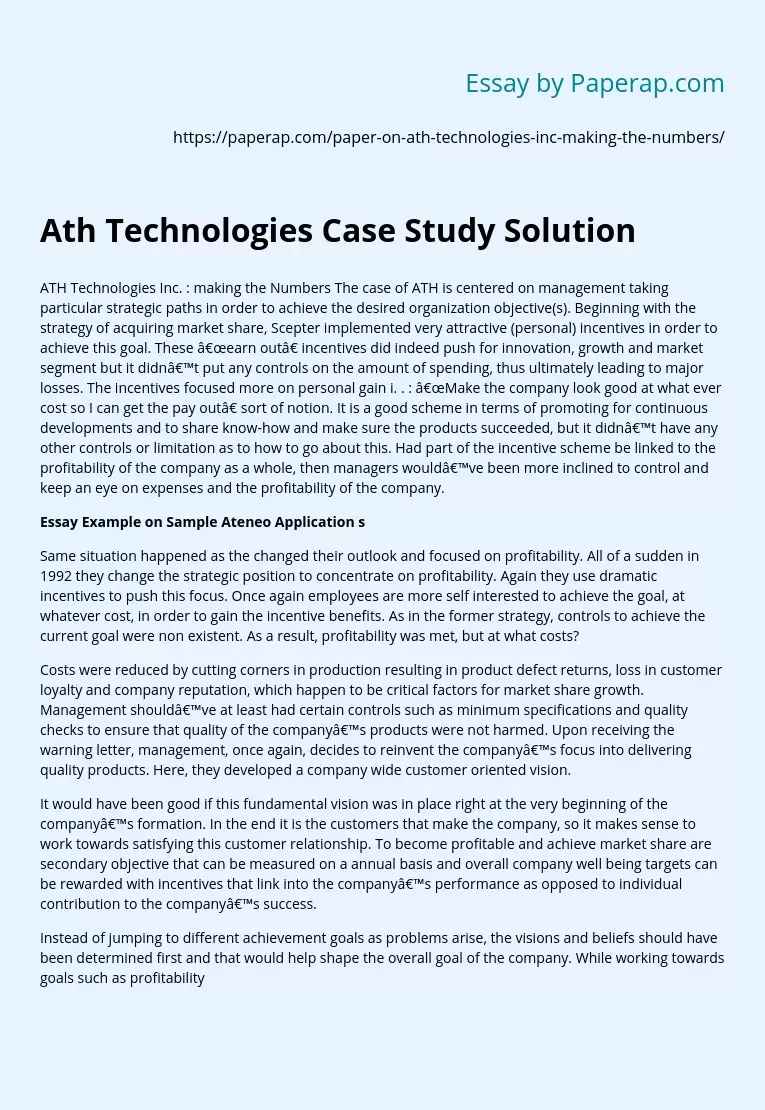Ath Technologies Case Study Solution
ATH Technologies Inc. : making the Numbers The case of ATH is centered on management taking particular strategic paths in order to achieve the desired organization objective(s). Beginning with the strategy of acquiring market share, Scepter implemented very attractive (personal) incentives in order to achieve this goal. These “earn out” incentives did indeed push for innovation, growth and market segment but it didn’t put any controls on the amount of spending, thus ultimately leading to major losses. The incentives focused more on personal gain i.
. : “Make the company look good at what ever cost so I can get the pay out” sort of notion. It is a good scheme in terms of promoting for continuous developments and to share know-how and make sure the products succeeded, but it didn’t have any other controls or limitation as to how to go about this. Had part of the incentive scheme be linked to the profitability of the company as a whole, then managers would’ve been more inclined to control and keep an eye on expenses and the profitability of the company.
Essay Example on Sample Ateneo Application s
Same situation happened as the changed their outlook and focused on profitability. All of a sudden in 1992 they change the strategic position to concentrate on profitability. Again they use dramatic incentives to push this focus. Once again employees are more self interested to achieve the goal, at whatever cost, in order to gain the incentive benefits. As in the former strategy, controls to achieve the current goal were non existent.
As a result, profitability was met, but at what costs?
Costs were reduced by cutting corners in production resulting in product defect returns, loss in customer loyalty and company reputation, which happen to be critical factors for market share growth. Management should’ve at least had certain controls such as minimum specifications and quality checks to ensure that quality of the company’s products were not harmed. Upon receiving the warning letter, management, once again, decides to reinvent the company’s focus into delivering quality products. Here, they developed a company wide customer oriented vision.
It would have been good if this fundamental vision was in place right at the very beginning of the company’s formation. In the end it is the customers that make the company, so it makes sense to work towards satisfying this customer relationship. To become profitable and achieve market share are secondary objective that can be measured on a annual basis and overall company well being targets can be rewarded with incentives that link into the company’s performance as opposed to individual contribution to the company’s success.
Instead of jumping to different achievement goals as problems arise, the visions and beliefs should have been determined first and that would help shape the overall goal of the company. While working towards goals such as profitability and growth, the visions and beliefs help keep employees in line and to some extent control the minimum expectations of the development of products, thus possibly lessen or avoid problems that did arise.
The incentive scheme were not properly designed to take into account effects of employee actions and the impact it would have on the company as a whole and other stakeholders. It should some what reflect and reiterate these visions instead of promoting and motivating employees to be self interested in their own affairs and achieving the targets at “all costs”. All in all, there were minimal controls and checks in place, it was more of a one way push towards the goals and not looking back at what was being sacrificed in the process.
Ath Technologies Case Study Solution. (2019, Nov 27). Retrieved from https://paperap.com/paper-on-ath-technologies-inc-making-the-numbers/

